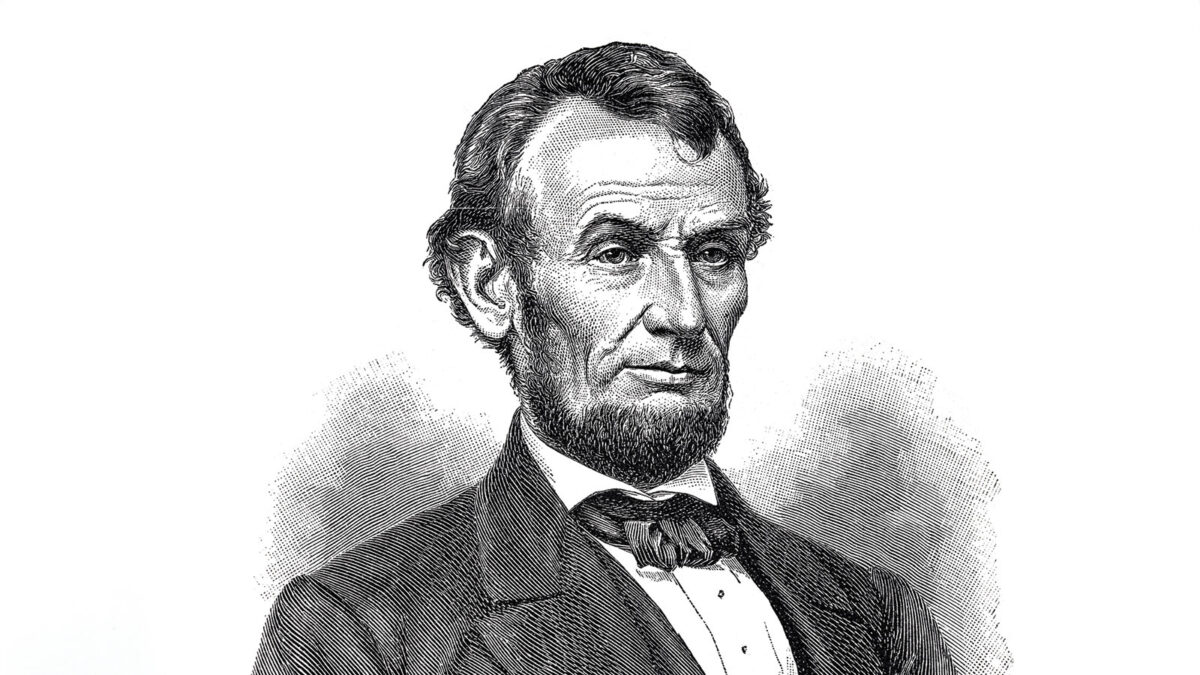
Abraham Lincoln’s Perseverance
May 2024
Download This Article (.pdf)
Over 20% percent of adults in the United States live with a mental illness.1The majority of public discussion about mental health addresses education, community support, treatment, and stigma. While these topics are needed to help alleviate suffering, one topic is rarely discussed: the skills an individual gains through the struggle with their mental illness. This article focuses on one of those skills: perseverance.
One notable figure who persevered despite mental illness is Abraham Lincoln. Abraham had at least four risk factors for the development of a mental illness:
- a history of mental illness in a blood relative;
- stressful life situations, such as financial problems or a loved one’s death;
- a childhood history of abuse or neglect; and
- few healthy relationships.2
Yet Abraham persevered throughout his life.
Abraham’s Childhood and Family History of Mental Illness
A brief look at Abraham’s early years demonstrates all four risk factors. Abraham described his mother, Nancy, as “intellectual, sensitive and somewhat sad.”3 His father, Thomas, “often got the ‘blues,’ and had some strange sort of spells, and wanted to be alone all he could when he had them.”4 Abraham’s great-uncle told a court that he had “a deranged mind.”5 His uncle, Mordecai Lincoln, had mood swings. All three of Mordecai’s sons were considered “melancholy” men.6 One cousin’s moods swung wildly between melancholy and mania. Another cousin had a daughter committed to the Illinois State Hospital for the Insane. Another family member referred to his own condition as “the Lincoln horrors.”7
Throughout his childhood, Abraham also faced major life stressors. When Abraham was 9, his mother, aunt, and uncle all died of the same illness. After Nancy’s burial, Thomas abandoned Abraham and Abraham’s sister Sarah to find a new wife. Abraham and Sarah were left in a “wild region” where “the panther’s scream filled the night with fear and bears preyed on the swine.”8 When Thomas returned with his new wife seven months later, his wife observed that the floorless cabin lacked a door and the children were living like animals, “wild—ragged & dirty.”9 Things did not get much better for Abraham with his father at home. Abraham was a voracious reader and became his own teacher. This created tension with his father because Abraham was expected to be in the fields doing strenuous physical labor beginning at age 8. Occasionally, his father would destroy Abraham’s books or whip him.
Abraham Leaves Home and Faces His First Major Depressive Episode
Although Abraham was engulfed by sadness at times, the endless battle with his father made Abraham more determined and ambitious. Abraham finished his indenture at 21 and immediately left to create a path for himself in the world.10 He moved to New Salem, Illinois, and, at age 23, declared himself a candidate for the Illinois General Assembly. Although the outcome was uncertain, Abraham stated he had been “too familiar with disappointments to be very much chagrined.”11 Abraham lost, but he stated only after being defeated “some 5 or 6 times” to “never try it again.”12 At age 25, Abraham ran for the state legislature again and won. Between legislative sessions, Abraham read the law, but “studied with nobody.”13
At the age of 26, there was serious concern about Abraham’s mental health. At the time, Abraham was studying the law day and night and also helping tend to the sick during an epidemic. When his friend Anna Rutledge fell ill, Abraham visited her often, and it was obvious to others that Abraham was distressed. Anna died of her sickness, and Abraham emotionally collapsed. He became emaciated, avoided human contact, and would wander off into the woods alone with his gun. Abraham told a mentor many times that he felt like committing suicide.
Friends and mentors rallied around Abraham. A justice of the peace watched over Abraham in his home for two weeks. Abraham’s friends also kept watch over him and would lock him up if necessary. The following year, Abraham related that “although he appeared to enjoy life rapturously . . . he was so overcome with mental depression, that he never dare carry a knife in his pocket.”14 This is considered Abraham’s first major depressive episode.
Abraham’s Battle With Depression Continues
When Abraham was 32, Illinois entered its third year of a recession. Before the recession hit, Abraham advocated for the development of transportation infrastructure. Illinois took on debt to complete the projects. Three years into the recession, the debt from the project crippled the state, Illinois’ credit rating was destroyed, and thousands lost their homes. Abraham took responsibility for the project and announced his retirement from the state legislature. Abraham realized his reputation had been compromised and the “burdens he had sought to lift from the people had instead been multiplied.”15 At the same time, Abraham broke off his engagement to Mary Todd. This hurt Abraham’s sense of honor and humiliated Mary once it became common knowledge. That winter, Abraham’s close friend Joshua Speed was planning to leave Illinois to join his family in Kentucky. As a result of these circumstances, Abraham experienced his most severe major depressive episode.16
Abraham remained bedridden, unable to eat or sleep, and “unfit to carry out his duties . . . . ”17 A fellow lawyer stated that Abraham was “delirious to the extent of not knowing what he was doing” and spoke incoherently.18 Doctors believed Abraham was “within an inch of being a perfect lunatic for life.”19 Abraham wrote to his law partner, stating that “I am now the most miserable man living. . . To remain as I am is impossible; I must die or be better. . . .”20 Joshua Speed stayed with Abraham during this extraordinarily difficult time in his life. It was during this long, difficult, and hard-fought depression that Abraham developed clarity for the reason he would live. Abraham told Joshua that he wished “to link his name with something that would redound to the interest of his fellow man.”21 Abraham also used humor and wit during his life in part to cope with his chronic depression. During the next decade of his life, Abraham rebuilt what he had lost, step by step.22
Despite battling depression, Abraham ultimately became president, confronted a divided nation, and had several other notable accomplishments, some of which are mentioned here. He issued the Emancipation Proclamation after making it clear that the issue was made up in his mind and the responsibility was his.23 Incompetent generals were replaced by order of Abraham.24 The 13th Amendment passed with Abraham’s help.25
The Wisdom of Abraham’s Experience: Perseverance
Focusing solely on Abraham’s struggles does not accurately describe the complex human being he was. There are dozens of books highlighting how Abraham, even during his darkest hours, provided leadership and achieved significant political victories. Abraham regarded depression as a misfortune, not a fault. “Fault implies a failure or a weakness for which a person should be held to account . . . . Misfortune is an unhappy circumstance, something bad that happened to a blameless good person.”26 Abraham’s journey shows how he handled the misfortune of depression.27
During a difficult time for the Union during the Civil War, Abraham’s friend Orville Browning came to visit him at the White House. Abraham was in the library and left instructions that he was not to be disturbed. Orville went in anyway. Abraham appeared “weary, care-worn, and troubled.”28 Orville expressed concern that Abraham’s health was suffering. Abraham responded, “Browning, I must die sometime.”29 Although clearly suffering, Orville found Abraham working to guide the nation through the war and lay new foundations for future generations. “The struggle of today, is not altogether for today . . . it is for a vast future also.”30
Abraham shared his message of perseverance with others. Abraham told a boy who had been rejected by Harvard to keep trying and that “there is no evidence that you may not yet be a better scholar, and a more successful man in the great struggle of life, than many others, who have entered college more easily.”31 Abraham told his law partner that what matters is that a person “keeps up his labors and efforts.”32 Abraham often argued that to succeed in the “great struggle of life” one had to endure failures and continue on.33 “The wisdom of what he called his own ‘severe experience’ taught him so.”34
“If things look dark, push harder.—Sunshine and blue sky are just beyond. If you are entangled, push—if your heart grows feeble, push, push. You’ll come out glorious, never fear. You are on the right track, and working with the right materials. So push along, keep pushing.”35
A Final Lesson
Today, there are many treatment options available for numerous categories of mental illness. Engage in services when suffering takes hold, and persevere. A short anecdote about Abraham offers a gentle reminder for anyone encountering difficult times.
Abraham was riding with a group to a city. The group rested in a dense grove of plum and crabapple trees. After some time, the group readied to ride out. However, Abraham was missing. One member said, “[W]hen I saw him last, he had caught two little birds in his hand, which the wind had blown from their nest, and he was hunting for the nest.”36 When Abraham returned to the group, he said, “I could not have slept tonight if I had not given those two little birds to their mother.”37
The lesson is to treat yourself as Abraham treated the birds, with tender kindness.
Related Topics
Notes
1. National Institute of Mental Health, https://www.nimh.nih.gov/health/statistics/mental-illness.
2. Mayo Clinic, https://www.mayoclinic.org/diseases-conditions/mental-illness/symptoms-causes/syc-20374968.
3. Shenk, Lincoln’s Melancholy (HarperOne 2006).
4. Id.
5. Id.; Ghaemi, A First-Rate Madness (Penguin Books 2012).
6. Shenk, supra note 3; Ghaemi, supra note 5.
7. Shenk, supra note 3; Ghaemi, supra note 5.
8. Shenk, supra note 3; Ghaemi, supra note 5; Goodwin, Leadership in Turbulent Times (Simon & Schuster 2018);
9. Shenk, supra note 3; Ghaemi, supra note 5; Goodwin, supra note 8.
10. Goodwin, supra note 8.
11. Shenk, supra note 3; Ghaemi, supra note 5.
12. Goodwin, supra note 8.
13. Shenk, supra note 3.
14 Id.
15. Goodwin, supra note 8.
16. Id.; Shenk, supra note 3.
17. Goodwin, supra note 8.
18. Id.
19. Id.
20. Id.
21. Id.
22. Id.; Shenk, supra note 3; ChatGPT and Kuntz, “Mental Health in History: Abraham Lincoln,” Montana Chapter of the National Alliance on Mental Illness (June 14, 2023), https://www.namimt.org/news/mental-health-in-history-abraham-lincoln.
23. Goodwin, supra note 8.
24. When General Grant unleashed General Sherman on the South, he “delivered a decisive, fatal blow to the economic and moral heart of [the] rebellion.” Ghaemi, A First-Rate Madness (1st ed. 2011); Goodwin, supra note 8.
25. Goodwin, supra note 8.
26. Shenk, supra note 3.
27. Id.
28. Id.
29. Id.
30. Id.
31. Id.
32. Id.
33. Id.
34. Id.
35. “How to Succeed,” Sangamo J./Ill. State J. (Jan. 7, 1853); Shenk, supra note 3.
36. Shenk, supra note 3.
37. Id.


